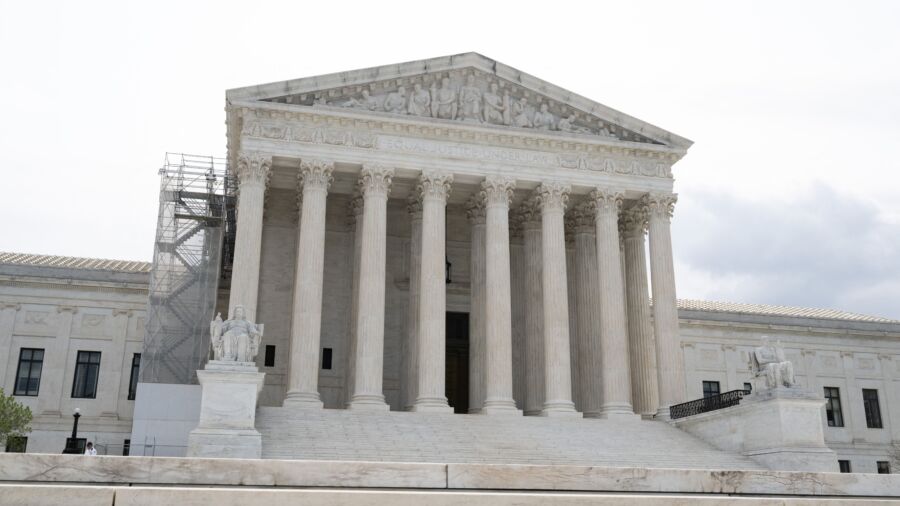Over the objections of two conservative justices, the Supreme Court decided last week not to take up a case about whether individuals suffering from gender dysphoria are protected by the Americans with Disabilities Act (ADA).
The June 30 decision to deny the petition for certiorari, or review, in Kincaid v. Williams (court file 22-633), is important because it is being interpreted as a victory for the transgender rights movement.
The order came the same day the court issued the last of 58 opinions in cases argued in the term that began in October 2022. Its new term begins with oral arguments on the first Monday in October.
For a case to move forward, at least four of the nine justices have to vote to grant the petition. In the new unsigned order in the case the court indicated the petition was dismissed but did not disclose the results of the vote taken by the justices.
In an opinion (pdf) dissenting from the denial of the petition, Justice Samuel Alito wrote that the nation’s highest court should have accepted the case to resolve an issue of “great national importance that calls out for prompt review.” Justice Clarence Thomas joined Alito’s dissent.
The new order leaves in place a U.S. Court of Appeals for the 4th Circuit ruling in favor of Kesha Williams, a former detainee in Fairfax County, Virginia, who was born male and now identifies as female. Williams’s lawsuit against the county is still ongoing.
The 4th Circuit ruling covers only the states in that circuit: Maryland, North Carolina, South Carolina, West Virginia, and Virginia.
Williams suffers from gender dysphoria, which can be defined as the intense discomfort or distress experienced by a person whose sex at birth is at odds with the person’s so-called gender identity.
Williams claimed he was mistreated and discriminated against while in the custody of the county, which failed to take his wish to have his purported female identity recognized.
In 2020, the Supreme Court embraced the concept of gender identity, which critics say is a social malaise that has been politicized, with solutions that haven’t been based on rigorous science. The court ruled 6–3 in Bostock v. Clayton County that employees cannot be fired from their jobs because of discrimination over their gender identity or sexual orientation.
‘Gender Identity Disorder’
The story of Williams, the respondent, goes back to 2018 when he was incarcerated for six months by Fairfax County in facilities overseen by the petitioner, Sheriff Stacey Kincaid, a Democrat.
In the beginning, Williams was placed in women’s housing but was later moved to men’s housing. Williams had reportedly been taking hormone treatments for 15 years but hadn’t had genital surgery.
Williams claimed his prescription hormone medication was taken away and that he was transferred to men’s housing after staffers refused to go along with his wish to be treated as a woman. He claimed his medical treatment was delayed and that he was harassed by fellow inmates and guards. Williams also claimed his requests to shower in private and have body searches performed by female deputies were denied, a SCOTUSblog summary stated.
A divided 4th Circuit found that the definition of “gender identity disorder” in use when the ADA was enacted has since been removed from the Diagnostic and Statistical Manual of Mental Disorders by the American Psychiatric Association.
The appeals court held that the statute should be interpreted to cover gender dysphoria in order to “avoid a serious constitutional question” that would arise if the law were read to “discriminate against transgender people as a class, implicating the Equal Protection Clause of the Fourteenth Amendment.”
Circuit Judge Marvin Quattlebaum, who was appointed by then-President Donald Trump, dissented in part, writing that gender dysphoria was covered under the phrase “gender identity disorders” in the act. To hold otherwise would give groups such as the American Psychiatric Association “the power to effectively modify statutes passed by Congress and signed into law by the President. That cannot be right.”
In his dissent, Alito wrote that he found “several aspects” of the lower court’s reasoning “troubling.”
The case raises “a host of important and sensitive questions regarding such matters as participation in women’s and girls’ sports, access to single-sex restrooms and housing, the use of traditional pronouns, and the administration of sex reassignment therapy (both the performance of surgery and the administration of hormones) by physicians and at hospitals that object to such treatment on religious or moral grounds,” the justice wrote.
“Without full briefing and argument, I would not take a firm view on the proper interpretation of the ADA, let alone on the merits of Williams’s particular case. But several aspects of the Fourth Circuit’s reasoning are troubling.”
For example, the circuit court’s “narrow focus on the phrase ‘gender dysphoria’ does not engage with the broad brush used by Congress, which barred application of the ADA not only to ‘transsexualism’ and ‘gender identity disorders not resulting from physical impairments,’ but also to ‘other sexual behavior disorders.’”
Kincaid’s attorney, Alexander Francuzenko of Cook Craig and Francuzenko in Fairfax, Virginia; and Williams’s attorney, Katherine Lynn Herrmann of the Erlich Law Office in Arlington, Virginia, both failed to respond by press time to a request by The Epoch Times for comment.
But Herrmann told The Associated Press that she was pleased that her client’s litigation will continue.
Alito’s dissent “understates the seriousness of gender dysphoria and the importance of ensuring the protections of the ADA apply equally to everyone, regardless of their gender identity.”
From The Epoch Times


